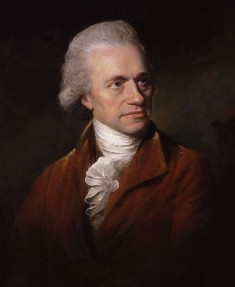Sir William Herschel holds a unique place in history as the man who discovered the planet Uranus. The magnitude of this achievement and the impact it had on the scientific community of the day cannot be overestimated.
Early Life and Education
Frederick William Herschel was born in 1738 in Hanover, Germany. His father, Isaac, was a musician which prompted young William to follow in his footsteps. It quickly became apparent that William was no ordinary student — he almost effortlessly mastered an array of musical instruments, from harpsichord to violin. He also displayed a deep intellectual understanding of music theory. He began writing his own music while still in his teens.
Herschel’s father sent William to England in 1757 along with his brother because he did not want his sons being forced into military duty for the Hanover Guard. William was 19. He was accused of desertion for fleeing his military obligation, but was later pardoned by King George of England.
Herschel’s remarkable musical talents enabled him to find work as a violinist among the finest orchestras in England. He was also much in demand for his skill as an organist. His extraordinary talent and great personal charm enabled him to rise quickly to the highest echelons of British cultural society. This not only earned him a comfortable income, but brought him into contact with powerful and important people.
Although he grew up speaking German, Herschel easily mastered English upon his arrival in Britain — in fact, he became fluent in just weeks. Herschel’s ability to learn any language was perhaps as remarkable as his musical talent. He went on to master French, Italian, Spanish, Greek and Latin.
It was Herschel’s interest in music theory that naturally led him to mathematics, which in turn brought him to astronomy, and then the study of optics. While he continued to make his living as a musician, he began building telescopes in his backyard and studied the night skies with extreme energy and dedication on every clear night.
Herschel the Telescope Maker
As his interest in astronomy grew, Herschel built bigger and bigger telescopes. He favored the Newtonian reflecting model which uses a large mirror as the primary light-gathering element rather than a lens. Herschel’s telescopes were considered by many to be the finest instruments in the world.
He brought design innovations and mirror-grinding techniques to a higher level of light-gathering ability, clarity of image and power of magnification. His greatest telescope was a 49-inch-mirror, 40-foot behemoth which would be the largest telescope in the world for years to come.
Growing Interest in Astronomy
Herschel’s astronomical work was multifaceted. Among his major projects was an effort to make a complete map of the heavens. Herschel hoped to determine the shape of the universe based on how stars were distributed throughout space. His work on double stars was groundbreaking. He is credited with the discovery of infrared sunlight. He was ever driven to keep building bigger instruments so that he could see further into space. Herschel said it was his goal to “see deeper into space than any man.”
Discovering Uranus
For thousands of years, since the first primitive people looked up to the stars, there had only been five known planets in addition to earth. That another planet might exist beyond Saturn was almost unthinkable. The “old solar system,” consisting of Mercury, Venus, Mars, Jupiter and Saturn, was practically an article of religion, even among scientists. It was the “natural order.”
But in March of 1781, William Herschel spotted a strange object that clearly showed to be a tiny disk through his telescope. Even with the most powerful of telescopes, all stars resolve to pinpoints because of their vast distance. So Herschel knew he could not be looking at an ordinary star. The tiny disk with a faint green tint must be something else — indeed it was — it was the seventh planet from the sun, Uranus.
When he discovered Uranus in 1781, Herschel became world famous. King George of England became a generous patron, granting Herschel considerable financial support and enabling him to work as a full-time astronomer and builder of telescopes. The sale of his telescopes also brought him considerable income.
Herschel’s Personal Life
Despite his fame and extraordinary brilliance, Herschel was known for his humble nature, as well as an almost uncanny charisma and charm. In the writings of others scientists and artists who met Herschel, many speak of his “good nature and kindness.” He possessed a marvelous sense of humor, and projected a certain “natural joyfulness” to others around him.
Herschel married later in life at age 50. In 1788, he married a widow, Mary Pitt. They had one child, a son, named John. John Herschel went on to become an astronomer and scientist of considerable reputation.
William Herschel died in 1822 at the age of 88 in his house at Slough, England. Although German-born, he spent his entire adult life in England as a British citizen. In addition to his major scientific discoveries, he wrote at least 24 symphonies and many other musical pieces.
